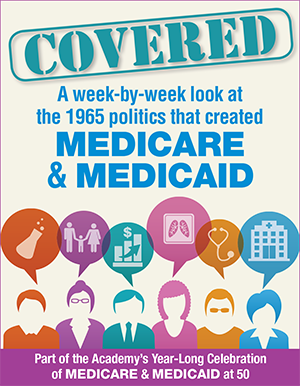Bob Rosenblatt, Special Correspondent
Throughout 2015, the Academy is working with partners to create a platform for dialogue around the history and future of these two vital programs, including this weekly Covered blog series. Covered is written by Bob Rosenblatt, a Senior Fellow at the National Academy of Social Insurance and editor of the website HelpWithAging. Learn more about the Academy’s celebration of the 50th anniversary of Medicare and Medicaid.
Medicare Would Allow Expanded Benefits for Workers in Unions
June 5, 1965
By Bob Rosenblatt, Special Correspondent
Washington, DC – The new hospital insurance benefit for people over 65 will save unions money on health care coverage for retirees, allowing them to negotiate increased benefits for current workers and wrap-around coverage for retirees, labor officials have told the House Ways and Means Committee.
For the first time, unions would be able to negotiate for complete lifetime health coverage for their members. During their working lives, members would have the health benefits won under collective bargaining. When they reach age 65, they would have two sources of coverage: the retiree benefits in their contracts, plus the new government benefit, called Medicare.
Money saved when Medicare covers the cost of health care for people over 65 “would make it possible to make available more extended benefits in other areas,” Melvin Glasser, director of the Social Security department at the United Auto Workers (UAW), said in testimony on February 5 at the House Ways and Means Committee.
The cost of medical care for the elderly is very high and the passage of the proposed Medicare legislation would make it possible to secure additional benefits through collective bargaining, Glasser said.
The UAW, with 400,000 members has been one of the leaders in the labor movement’s push to expand benefits for members and their dependents. Its most recent contract with the automakers provides for extensive health care benefits starting in 1966. The new contract with General Motors, for example, includes post-hospital care either in a nursing home or with home care. Such benefits would be available for approximately 150,000 workers and 100,000 to 125,000 of their dependents.
The new contract anticipates the passage of Medicare that would cover people over 65 with a clause that permits the reduction of benefits that are provided by Federal law. This would make the money saved available for other negotiated benefits. Glasser read this provision of the contract during his Ways and Means testimony to emphasize the new opportunities it brings for the union. GM retirees would not see any reduction in benefits. They would simply get coverage through through Medicare, if the new program is approved by Congress.
The Medicare program was passed by the House in March and awaits likely approval by the Senate. It includes hospital coverage financed by taxes on workers and their employers. Everyone over 65 would be covered, with these benefits: 60 days in the hospital for each spell of illness; up to 100 days of care in a nursing home or convalescent facility, and 120 days of home care visits, taking place after discharge from the hospital. The program would be administered by the Social Security Administration.
A second element of the Medicare program, called Part B, would cover bills for visits to the doctor’s office, or treatment delivered by a doctor in the hospital. This voluntary program would cost $6 a month, with $3 paid by the individual and $3 by the federal government. There would be a $50 annual deductible, and patients would then pay 20% of the charges by the doctor.
The Senate passed a similar bill last year, but it didn’t survive a conference with the House. Passage is much more likely this year because the 1964 election increased the ranks of Democratic supporters of the proposal.
Medicare may save money if people are able to transfer from hospitals to less expensive facilities, according to the UAW. Often, “patients are maintained in expensive general hospital beds beyond that period required by their medical conditions,” the UAW said in a January 18th press release discussing its new contract with GM. “This happens because insurance is not available for care in the more appropriate long-stay facilities.”
“This benefit [in the contract] is designed to correspond with modern trends in medical care,” the UAW said. “Hospitalization for chronic illness is rapidly becoming a greater problem than that for acute illness.”
AFL-CIO officials were not able to provide detailed numbers on how many people over 65 are receiving hospital care or other medical coverage under union contract, and how much money is spent on their behalf.
But Medicare offers what unions and their members would consider a welcome form of complete coverage: members of unions would get health insurance throughout their working careers through contracts with their employers. And then, at age 65, the workers would retire and begin coverage under Medicare’s tax-payer financed umbrella of protection against any deluge of big medical bills.
► Directory of COVERED posts
► Read the next post in the COVERED series “White House in Political Battle Between Medical Specialists and Labor”
► Learn more about the Academy’s celebration of the 50th anniversary of the enactment of Medicare and Medicaid

